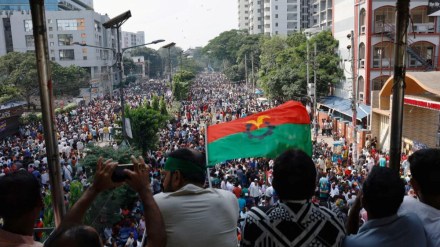Thousands of people gathered peacefully in Dhaka, Bangladesh’s capital, on Saturday to demand justice for over 200 students and others killed during last month’s protests. The demonstrators, chanting anti-government slogans, called for Prime Minister Sheikh Hasina’s resignation. The protests, initially student-led, have now garnered support from various sectors of society.
While Dhaka saw peaceful protests, violence erupted at similar events elsewhere. Prothom Alo, a leading Bengali-language newspaper, reported that at least seven protesters were shot in Cumilla, eastern Bangladesh, allegedly by pro-ruling party groups as they blocked a road. The daily added that at least 30 protesters were injured in the violence, though a local ruling party leader denied their supporters’ involvement. TV stations reported injuries across the country.
Point of origin and what’s happening now?
The protests originated from student demands to abolish a quota system for government jobs, which they deemed discriminatory. Under the system, 30% of government jobs were reserved for families of veterans from Bangladesh’s 1971 war of independence against Pakistan. Initially peaceful, the protests turned violent on July 15 when Dhaka University students clashed with police and Awami League party activists. Since then, more than 200 people have died, and thousands have been injured.
On July 21, the Supreme Court reduced the veterans’ quota to 5%, but protests have persisted amid outrage over the violence. Authorities responded by closing schools and universities, blocking internet access, and imposing a shoot-on-sight curfew. Recent weeks have seen at least 11,000 arrests. While internet services have resumed and businesses have reopened, tensions remain high.
Prime Minister Hasina offered to negotiate with student leaders on Saturday, but Nahid Islam, a leading protest coordinator, rejected the proposal via Facebook, stating, “One cannot ask a killer government for justice or sit for talks with them.”
Hasina reiterated her commitment to investigate the deaths and punish those responsible, stating she was open to dialogue. The protests pose a significant challenge for Hasina, who secured her fourth consecutive term in January amid an opposition boycott.
What are protesters demanding?
Initially, the students presented a nine-point demand, including a public apology from Hasina and the release of arrested students. On Saturday, however, they unified their demands to a single point: the resignation of Hasina and her administration. They also called for a “non-cooperation” movement, urging people to withhold taxes, utility payments, and close factories and offices.
In response, the ruling party called on its supporters to demonstrate nationwide on Sunday. Hasina and other ministers have blamed the opposition Bangladesh Nationalist Party and the now-banned Jamaat-e-Islami party for infiltrating and inciting violence during the protests, accusations both parties deny. Mirza Fakhrul Islam Alamgir, secretary-general of the Bangladesh Nationalist Party, pledged continued support for the protesters.
(With inputs from agencies)
